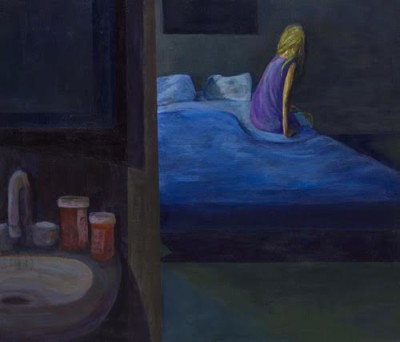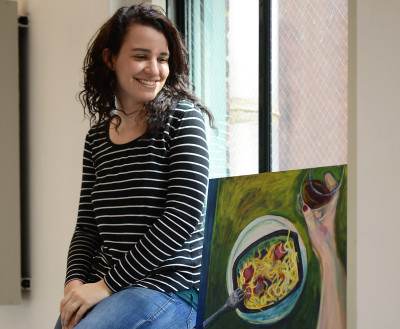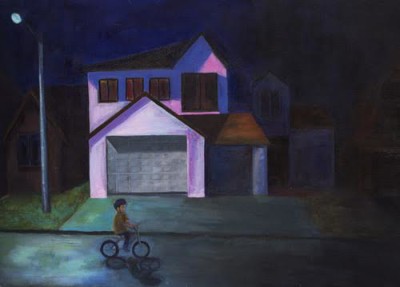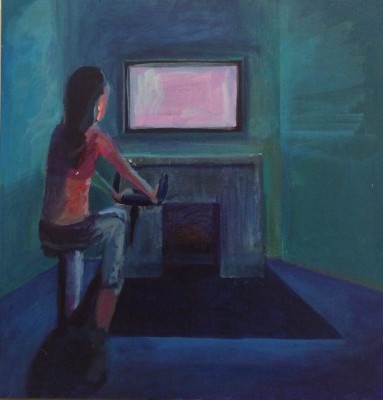“Senior Thesis Spotlight” is an ongoing NSFP feature series showcasing interesting thesis projects being done by current seniors at The New School and discussing their process, inspirations and experiences.
Fumbling with her lock, Kate Saubestre, 21, an Illustrations major at Parsons, attempted to get a key out of her locker to unlock room 805A where she keeps her work in progress paintings. After rummaging through her locker, she discovered that the key was missing.
In a composed response, Kate shrugged the issue off. Despite her thesis class being in one hour, Kate feels she is at a good enough place in her senior thesis project to avoid stressing over. She credits her time management and the support system among her senior class for keeping her productive and mentally sane throughout this turbulent process.

“We [seniors] all get together and discuss everything, which is really nice to have that kind of network of support,” she said. “A lot of us are anxious and thinking a lot about our projects but it’s definitely something that’s manageable.”
Senior thesis or the senior capstone project is a semester or year long independent project where students choose a topic of interest and explore their subject through research and the development of a creative project or written paper. Although the thesis process is rigorous, Kate sees it as something that her 4 years of college work has been building up to.
“It’s nothing that we really haven’t been through before but because it has the word thesis on it, I think we make it out to be more than it actually is,” she laughs. “Just do something that you’re passionate about.” For Kate, this passion came in the form of painting the simplistic and monotonous lifestyle of suburbia.
For some New School students, attending college in New York City is a way for them to escape the confines of their slow suburban hometowns. Although she has lived all around the world from France to Abu Dhabi, Kate finds that the same mundanity of the suburbs that most people view as dull is exactly what is so fascinating about it.

“I grew up abroad across seven countries and never had the opportunity to live in the States until moving to New York for college,” she says. “So suburbia felt very much like the quintessential America that I dreamed of being a part of as a kid.”
Inspired by her time living in Calgary, Canada, she was drawn to the mundane setting of suburbia and began to artistically depict her secluded environment through her outsider perspective.
“I actually started creating art in Canada because I didn’t know what to do with myself and my time,” she says. “For me, it was an exploration of my feelings about being in Canada and feeling stuck after coming from really exotic places.”
Influenced by suburban-centric, coming-of-age films such as The Virgin Suicide and Accidents Happen, Kate was intrigued by the issues facing American youth, especially relating to those of adolescent women in the suburbs. “When your life is so stagnant and boring, you almost want to be these complex characters on TV who have more issues than maybe you do,” she said. Even though she dislikes forcing a certain view onto her audience, she hopes to subtly depict the role that TV culture plays in suburbia and themes like escapism, gender and consumerism in her acrylic paintings. “Art can communicate what I can’t say in words,” she says.

In an effort to research more about American suburbs, Kate has also visited a few suburbs in New Jersey and around the Philadelphia area to interview and photograph people who grew up there to serve as references for her work. She became interested in how different living environments shape an individual’s upbringing and perceptions. “Suburbia is designed to be a very privatized thing. I always refer to it as ‘ticky tacky boxes’ because you’re put into your house with your walls up, you go to your car to go to work or school, and that’s all you pretty much do,” she laughs again.
As an Illustrations student, Kate is also expected to keep a journal to document her ideas and process of producing her collection of work. But she’s taken an unconventional approach. Instead of recording daily logs, she has written fictitious diary entries from the point of view of a young woman living in the suburbs.
“I don’t like talking about my work as much,” she says humbly. “I don’t want to tell people what they’re looking at because I feel like that defeats the purpose of illustration a little bit.”

Through her writing, she immerses herself into the world of suburbia in order to better understand her subject and convey the emotions of the people living there. “I wanted to develop this character that would fit the mood of my pieces,” she said. “The journal provides the inner thoughts that a character who lives in the space might have so it connects with my paintings in that way.”
However, Kate often finds herself overthinking what she wants her thesis to represent and questioning the creative direction of her project. “It’s nice to hear other people’s opinions but when it comes down to it, thesis is so free that nobody is telling you what to do,” she says. “They might be giving you critiques and advice but you really don’t have to listen to anyone if you don’t want to.”

Despite its intensity, the thesis process is ultimately rewarding in the end in Kate’s eyes. “It’s been rough but I just really want a great series of paintings that I can look back on and say that I put in the work and time and be like ‘Yay, I did it!’”
Kate advises rising seniors to not be intimidated by the thesis process and avoid putting too much pressure on themselves. “Do your work and do something you care about,” she says. “Just create things and eventually something will come out of that and I think that helps you streamline your thoughts.”
An essential takeaway for her is realizing during her thesis process that it’s not all about the end product but rather your journey and how you have changed from start to finish. “Your body of work isn’t going to define who you are as a person even though we all think it’s going to,” she said reassuringly.
“Nothing in thesis is the end of the world.”







